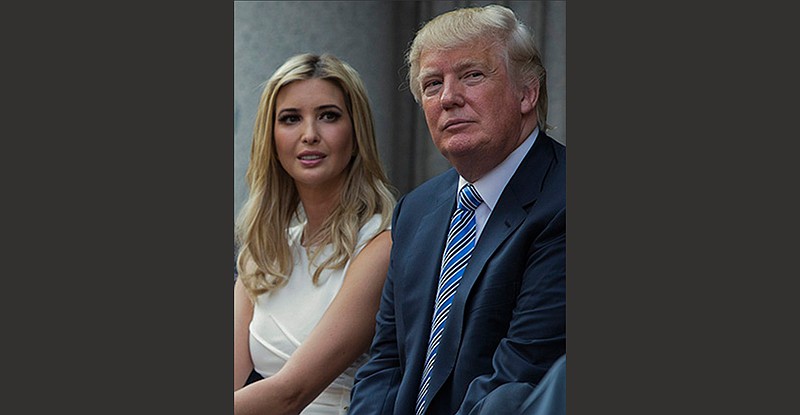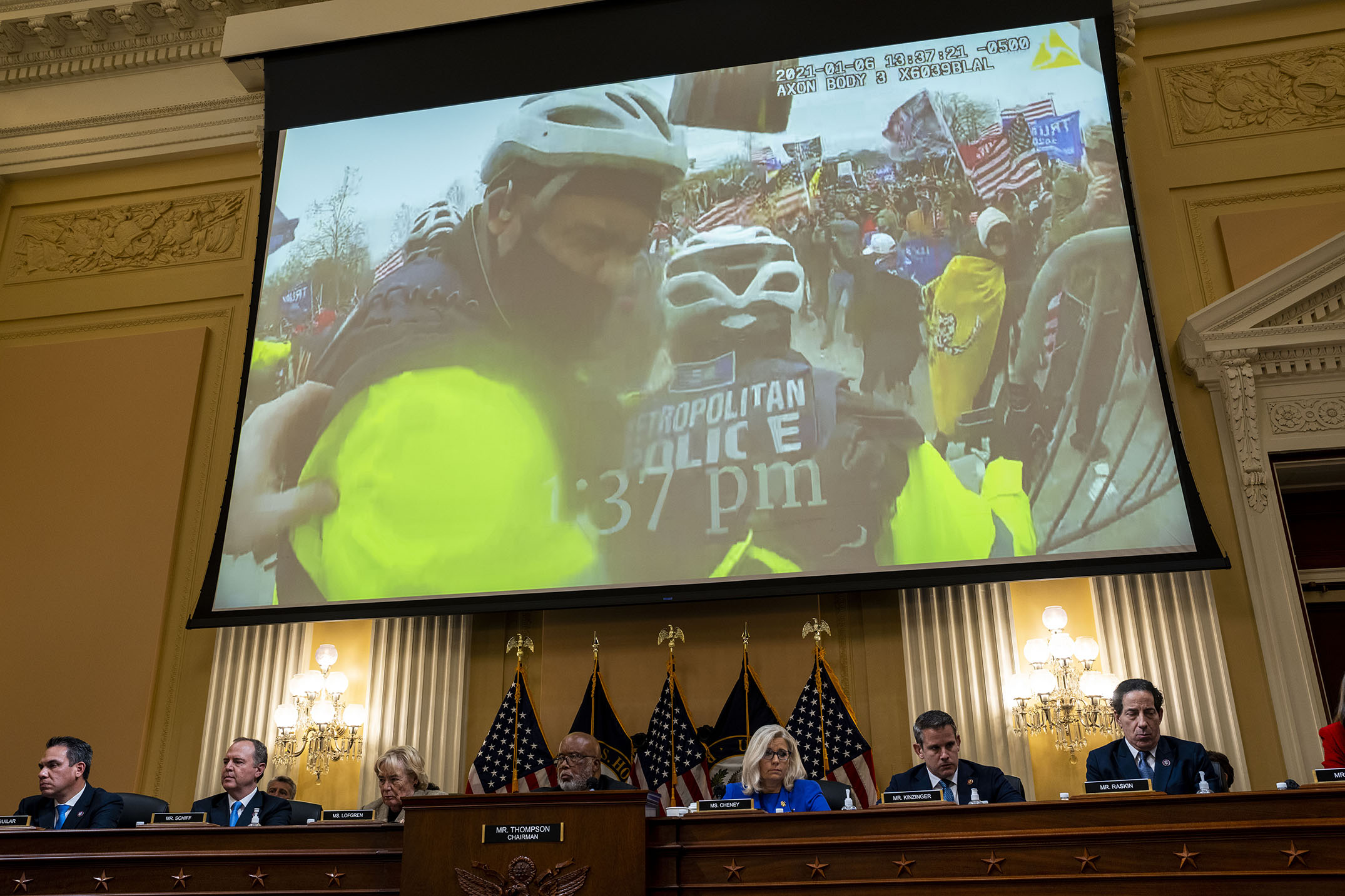WASHINGTON -- Former President Donald Trump, long known for distancing himself from or tossing aside staff members who contradicted him while he was in the White House, discovered a new target Friday: his elder daughter.
The morning after the House committee investigating the Jan. 6, 2021, attack on the Capitol played recorded video testimony of his daughter Ivanka Trump at its prime-time public hearing, Trump used his social media website to separate himself from what she had said and to say she was "checked out" during the final days of his administration.
In the testimony, Ivanka Trump said she was influenced by a Dec. 1, 2020, statement by William Barr, then the attorney general, that there was no widespread fraud that had altered the outcome of the election. She testified that she respected Barr and "accepted what he was saying."
"Ivanka Trump was not involved in looking at, or studying, Election results," Trump wrote on his social media platform, Truth Social, in one of eight messages he posted there in response to the hearing. "She had long since checked out and was, in my opinion, only trying to be respectful to Bill Barr and his position as Attorney General (he sucked!)."
Ivanka Trump was a senior adviser in the White House, and she continued to work in the administration until the end. Her colleagues have recalled her being among those urging White House staff members on election night to "fight" even as it became clear that her father would most likely lose.
Her husband, Jared Kushner, who was also a senior adviser in the White House, attended several meetings about post-election strategy with a range of political and West Wing advisers, as well as lawyers like Rudy Giuliani.
Pushing back on his daughter's comments was only one way in which Donald Trump assailed the hearing, the first in a series of sessions to be held by the House committee this month.
He denied having responded approvingly to the "Hang Mike Pence!" chants bellowed about the vice president by some of the rioters at the Capitol on Jan. 6, an account shared during the hearing by Rep. Liz Cheney, R-Wyo., the panel's vice chair.
"I NEVER said, or even thought of saying, 'Hang Mike Pence,'" Trump wrote on the social media site. "This is either a made up story by somebody looking to become a star, or FAKE NEWS!"
Cheney did not say he had used those words, but she quoted testimony that Trump had responded to the chants by saying that "maybe our supporters have the right idea" and that Pence "deserves it."
In another post on the site, Trump described the committee as a "totally partisan, POLITICAL WITCH HUNT!" And in two other posts, he attacked Barr, calling him a "coward," "weak and frightened," "stupid" and "scared stiff of being impeached."
Meanwhile, President Joe Biden spoke of the importance of the committee's investigation in remarks Friday in Los Angeles.
"The insurrection on Jan. 6 was one of the darkest chapters in our nation's history," the president said, "a brutal assault on our democracy."
Americans, Biden said, must "understand what truly happened and to understand that the same forces that led to Jan. 6 remain at work today."
PANEL'S PLANS
The House committee investigating the Jan. 6, 2021, riot on the Capitol has laid out a road map for the hearings this month as it examines Trump's responsibility for the melee and damage that resulted for law enforcement officers, members of Congress and others in attendance that day.
The next round of hearings won't take place in prime time like the debut Thursday, but lawmakers will go into greater detail about specific aspects of the insurrection.
Cheney said lawmakers will present evidence Monday at the second hearing showing that Trump "engaged in a massive effort to spread false and fraudulent information" that the election had been stolen -- even though advisers and allies told him repeatedly he had lost.
The panel touched on that theme in its first hearing with a clip from Trump campaign lawyer Alex Cannon, who was shown discussing conversations with then-White House chief of staff Mark Meadows sometime in November 2020.
"I remember sharing with him that we weren't finding anything that would be sufficient to change the results in any of the key states," Cannon said.
When asked how Meadows responded, Cannon said: "I believe the words he used were, 'so there's no there there.'"
Cheney says the third hearing Wednesday will focus on how Trump pushed for the Justice Department to "spread his false stolen election claims in the days before January 6." Senior Justice Department officials refused, telling him his claims were not true.
She noted how Trump sought to elevate Jeffrey Clark, an environmental lawyer at the department, to the job of acting attorney general. Clark had drafted a letter to send to Georgia and five other states saying the Justice Department had "identified significant concerns that may have impacted the outcome of the election."
Trump nearly gave the top job to Clark but backed down when senior Justice Department leadership and White House lawyers threatened to resign, testimony has shown.
"The men involved, including acting Attorney General Jeff Rosen and acting Deputy Attorney General Richard Donoghue, were appointed by President Trump," Cheney said. "These men honored their oaths of office. They did their duty, and you will hear from them in our hearings."
Clark has invoked his Fifth Amendment privilege against self-incrimination and refused to testify before the committee.
Cheney said the fourth hearing will focus on Trump's efforts to pressure Pence to stop Congress from certifying some electoral votes for Biden on Jan. 6 -- something he had no power to do in his ceremonial role.
The day promises plenty of political intrigue as both Trump and Pence seek to shape the Republican Party for years to come, and perhaps make a run for the presidency in 2024.
Cheney said the fifth hearing, expected the following week, will focus on the president's efforts to pressure state legislators and state election officials to change the election results, including additional details about Trump's call to Georgia officials urging them to "find" 11,780 votes.
She also is promising new details about efforts to instruct Republican officials in multiple states to create false electoral slates and transmit those slates to Congress, Pence and the National Archives, falsely certifying that Trump won states he had actually lost.
Cheney said the final two hearings will focus on how Trump summoned supporters to march on the Capitol, and when the violence was underway, failed to take immediate action to stop them.
The last hearing will have a moment-by-moment account of Trump's response to the attack from former White House staff, both through live testimony in the hearing room and via videotape.
"There is no doubt that President Trump was well aware of the violence as it developed," Cheney said. "White House staff urged President Trump to intervene and call off the mob."
Information for this article was contributed by Maggie Haberman of The New York Times and by Lisa Mascaro, Eric Tucker, Mary Clare Jalonick, Farnoush Amir, Kevin Freking, Michael Balsamo, Jill Colvin, Darlene Superville, Zeke Miller and Alanna Durkin Richer of The Associated Press.

